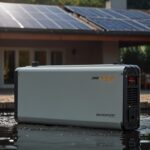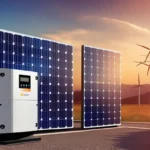Are you worried about how long does a solar inverter last? Are you concerned that it might break down, leaving you with a hefty repair bill and a reduced energy output? You’re not alone. As a homeowner who’s invested in solar energy, you want to ensure that your system runs smoothly and efficiently for years to come.
One of the most critical components of your solar panel system is the inverter. It’s the brain of your setup, converting DC power from your panels into AC power that your home can use. But how long does a solar inverter last? In this article, we’ll delve into the lifespan of solar inverters, the factors that affect their longevity, and what you can do to maximize their efficiency.
The Average Lifespan of a Solar Inverter
While the costs of solar inverter can be on the higher end the average lifespan of a solar inverter is around 10 to 15 years. However, some high-quality inverters can last up to 20 years or more. The lifespan of an inverter depends on various factors, including the quality of the device, usage patterns, and environmental conditions.
Factors Affecting the Lifespan of a Solar Inverter
Several factors can impact the lifespan of your solar inverter. Here are some of the most significant ones:
Quality of the Inverter: A high-quality inverter from a reputable manufacturer can last longer than a cheaper, low-quality alternative. Look for inverters with a good warranty and a proven track record of reliability. Would be better if solar inverter is waterproof or water resistant.
Temperature: Extreme temperatures can affect the lifespan of your inverter. High temperatures can cause the device to overheat, while low temperatures can slow down its performance.
Humidity: High humidity can lead to corrosion and damage to the inverter’s internal components.
Usage Patterns: If you’re using your solar panel system extensively, your inverter may have a shorter lifespan. This is because it’s working harder to convert DC power into AC power.
Maintenance: Regular maintenance of solar inverter can help extend the lifespan. This includes cleaning the device, checking for faults, and updating software.
Signs of a Failing Solar Inverter
It’s essential to monitor your inverter’s performance to identify any signs of failure. Here are some common indicators of a failing inverter:
Reduced Energy Output: If your energy output is decreasing, it may be a sign that your inverter is malfunctioning. Check your inverter’s performance regularly to ensure it’s working efficiently.
Error Messages: If you’re seeing error messages on your inverter’s display, it may indicate a problem with the device. Check your inverter’s manual to understand what the error messages mean and how to resolve them.
Overheating: If your inverter is overheating, it can cause damage to the internal components. Check the temperature regularly and ensure solar inverter is installed in a well-ventilated area.
Age: If your inverter is approaching the end of its expected lifespan, it’s time to consider replacing it. Keep track of your inverter’s age and plan for replacement when necessary.
Improve the Lifespan of Your Solar Inverter
To get the most out of your solar inverter, follow these tips:
Regular Maintenance: Regularly clean your inverter and check for faults. Ensure all connections are secure and clean, and check for any signs of wear and tear.
Monitor Performance: Keep an eye on your energy output and inverter performance. Use a monitoring system to track your inverter’s performance and identify any issues early.
Update Software: Regularly update your inverter’s software to ensure you have the latest features and bug fixes. This can help improve your inverter’s performance and efficiency.
Choose a High-Quality Inverter: Invest in a high-quality inverter from a reputable manufacturer. A good inverter can last longer and provide better performance.
Conclusion
A solar inverter is a critical component of your solar panel system, and its lifespan can significantly impact your energy output. By understanding the factors that affect an inverter’s lifespan and monitoring its performance, you can maximize its efficiency and extend its lifespan.







